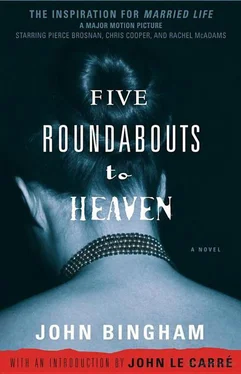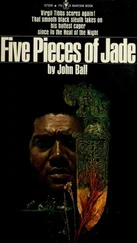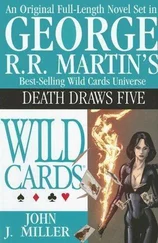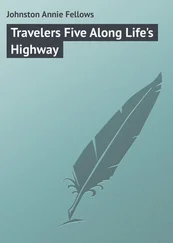John Bingham - Five Roundabouts to Heaven
Здесь есть возможность читать онлайн «John Bingham - Five Roundabouts to Heaven» весь текст электронной книги совершенно бесплатно (целиком полную версию без сокращений). В некоторых случаях можно слушать аудио, скачать через торрент в формате fb2 и присутствует краткое содержание. Жанр: Криминальный детектив, на английском языке. Описание произведения, (предисловие) а так же отзывы посетителей доступны на портале библиотеки ЛибКат.
- Название:Five Roundabouts to Heaven
- Автор:
- Жанр:
- Год:неизвестен
- ISBN:нет данных
- Рейтинг книги:4 / 5. Голосов: 1
-
Избранное:Добавить в избранное
- Отзывы:
-
Ваша оценка:
- 80
- 1
- 2
- 3
- 4
- 5
Five Roundabouts to Heaven: краткое содержание, описание и аннотация
Предлагаем к чтению аннотацию, описание, краткое содержание или предисловие (зависит от того, что написал сам автор книги «Five Roundabouts to Heaven»). Если вы не нашли необходимую информацию о книге — напишите в комментариях, мы постараемся отыскать её.
Five Roundabouts to Heaven — читать онлайн бесплатно полную книгу (весь текст) целиком
Ниже представлен текст книги, разбитый по страницам. Система сохранения места последней прочитанной страницы, позволяет с удобством читать онлайн бесплатно книгу «Five Roundabouts to Heaven», без необходимости каждый раз заново искать на чём Вы остановились. Поставьте закладку, и сможете в любой момент перейти на страницу, на которой закончили чтение.
Интервал:
Закладка:
There is no longer hate, if there ever were hate, for he knows that the cause of the hatred will soon be removed.
There is no longer gnawing greed, if her money be the motive, for his financial cravings will soon be satiated. And if lust for another woman is the driving force, he is soothed by the thought that shortly his desires will be completely fulfilled.
He watches her, therefore, in a detached way; sees her going about her household chores, cleaning, making the beds; observes her quietly reading in the evening, or sewing and listening to the radio; hears her, too, making plans; what dress she will buy, whom she proposes to invite to tea, what film she intends to go and see.
All the while he is thinking: You won’t be doing that work much longer; neither sewing, nor reading, nor carrying out your other plans; that mechanism which you call your body will soon be stilled.
You will be dead and in your grave. Finished. You think you have your own little future, like other people, and you are filled with your own hopes and modest ambitions.
You think that I am fond of you; you think you can trust me, or you would not remain under my roof; you think I would even protect you from danger.
But you’re wrong. I’m going to kill you.
The mind of the normal wife-murderer must therefore be almost animal-like in its lack of sensitivity, or it must be twisted, perverted with a kind of cat-and-mouse sadism raging within it.
But Bartels was an exception.
So far from lacking sensitivity, he had too much; and so far from being sadistic, he was too kind.
I brooded over these contradictions that evening when I returned to the chateau. I could not as yet entirely resolve the problem. I could not see how a man of Bartels’ temperament could fill the role of one who was either cloddishly insensitive or gloatingly feline.
But I was continually conscious of a sensation of discovery, for I felt instinctively that as the next part of the story unfolded in my mind, I should be groping still nearer to the solution of at least one part of the mystery. I had already sensed that pity, the inability to inflict pain, had played a part in Bartels’ action. What I had not hitherto realized was the devastating effect which this had had on him.
Now I was beginning to get a clearer picture and, collating all that I knew, I suddenly saw that, queerly enough, it was Beatrice herself who made up Bartels’ mind for him, not by any conscious deed, or quarrel, or hurtful words, but by a small instinctive action in the early hours of the morning, while she lay in bed more than three parts asleep.
Chapter 8
Bartels had driven down to Thatchley, and dined with Lorna. She had been very sweet to him that evening, because she knew his kindly nature, and knew also, therefore, that a struggle was going on in his mind, though she obviously had no idea of its exact nature.
He left her at about 11.30 p.m. and set out on the road home, and Beatrice’s chances of life increased as he felt the car answering to his touch and listened to the hum of the engine.
Driving, the feeling of controlling a car, always increased his self-confidence, helped to smooth out his worries. At such moments he recaptured a belief that, given the right set of circumstances, he still could carry out his earlier plan, and that he and Beatrice would be able to go their own ways in peace, and perhaps even friendship.
Bartels drove at speed that night, but without effort; he was a fine driver. The weather was dark, but cold and dry, and there was only an occasional car on the road at that hour. For long stretches at a time the road was well studded with catseyes, and the bends were gentle.
As he drove down the slope leading into Cobham, his headlamps picked up a fox slinking swiftly across the road, its belly close to the ground. He caught a glimpse of its pointed mask, and was surprised to come upon a fox in that area.
For a few moments it distracted his mind from the burden which was weighing it down. He thought of uncle James, and his wish for one day out fox-hunting before he died; and of an abortive fox-shoot which he himself had attended in Germany in 1947; and of his last close view of Germany, when he hurried from the Volkswagen, out of the sleet and the biting wind, into bomb-battered, dingy Hannover station.
The station was dirty from day and night use by thousands of men, women, and children, refugees from the east, businessmen in shabby suits clutching their attache cases, and women with mysterious bulging cloth carrier bags back from the country after bartering clothes, jewellery, anything, for food.
There were deep shadows, and a few weak electric-light bulbs, and draughts, and the strange musty smell formed by a mixture of German ration soap, German-grown tobacco, German perspiration; and always the raw, icy wind blowing eternally through the battered station.
Bartels dropped smoothly into Cobham, and followed the road as it curved through the village to the left, and thought: There you had it, in Hannover Station, the fruition of the dreams of revenge, the final triumphant blossoming of hatred’s hopes, the chance to look, to listen, to smell, to gloat, and to say: “Serve the swine right! They asked for it!”
In the main hall of the station, he remembered, a woman stood with a cheap pram in which a child lay, and two other children stood by her side. She had a round, yellow face, and wore glasses and was tall, and not very fat or very thin: just dull-looking. The group stood isolated beneath a light, caught in an island of illumination, as though picked out by an overhead searchlight, and the woman turned her head this way and that, as though looking for something or somebody, miserable and bewildered. That was defeat, that was our revenge.
If you went down below the station, to the former air-raid shelters, you found a thousand or two people herded together; some were there because it was warm, and the trains were always hours late, and you had to wait somewhere; others were there to do black-market deals; others because, in all Hannover, by day and by night, they had no other roof under which to shelter.
Here you met it again, hitting you in the face, the German smell, the stink of defeat and misery.
There were tables and hard chairs, but not enough, and a counter where you could queue and get a hot drink, if you had the right coupons. You picked your way carefully, in those foetid, smoky, musty vaults, shouldering your way through the human jungle, stepping over trunks, avoiding handbags, and legs, and feet, and bodies; some people were sitting or lying, some were awake, some sprawled asleep.
A seventy-year-old woman, with grey, streaky hair hanging lankly, sits on a suitcase, head on arms, knees up, eyes closed. A child lies across the end of a trunk, yellow hair touching the ground, sprawled out, ungainly, grotesque, as though a giant had used her as a toy, and then had tossed her down. She is asleep, despite the raucous songs from one corner of the room, the burble of voices, the shuffle of feet.
In the middle of the rooms the air is thick and foul and chokes you like cotton wool; but it is warm, it is away from the vicious wind, and the sleet, and the snow. So you pick your way gingerly past the woman with the crying baby, and the filthy ragged man mumbling to himself, and past, with greater care, the groups of long-haired, grubby youths who hang around and plot and trade in cigarettes and other unobtainable things. They look at you curiously with their grey faces and grey eyes, and would like to provoke an incident and beat you up and rob you.
Bartels took the final bend in the road out of Cobham, and thought: It’s so easy to hate at a distance. You read your newspaper, and you are well fed, and reasonably happy, and you say: “Let ’em suffer. We did.”
Читать дальшеИнтервал:
Закладка:
Похожие книги на «Five Roundabouts to Heaven»
Представляем Вашему вниманию похожие книги на «Five Roundabouts to Heaven» списком для выбора. Мы отобрали схожую по названию и смыслу литературу в надежде предоставить читателям больше вариантов отыскать новые, интересные, ещё непрочитанные произведения.
Обсуждение, отзывы о книге «Five Roundabouts to Heaven» и просто собственные мнения читателей. Оставьте ваши комментарии, напишите, что Вы думаете о произведении, его смысле или главных героях. Укажите что конкретно понравилось, а что нет, и почему Вы так считаете.












